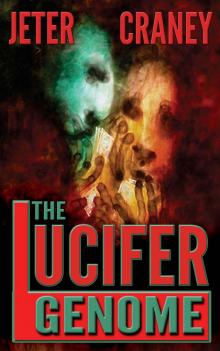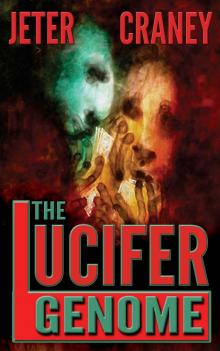- Home
- Glen Craney
The Fire and the Light Page 6
The Fire and the Light Read online
Page 6
“The prophets and saints have written all the words required.”
She saw that he was a taciturn, self-contained man who could not linger long without performing some useful task. But he continued to hold her hand, and that gesture was more telling than a thousand musings of love. As they angled their way through the brush, her thoughts turned to her mother and how she would have made this same punishing climb alone on the day of her disappearance. It was a possibility long on odds, but if she could find the old Cathar healer atop this crag, she might learn more about her disappearance.
After a half-hour of labored climbing, Guilhelm lifted her to the flat promontory that crowned the mount. A tangled garden of limestone rocks surrounded them. They stood so elevated that the horses looked like ants in the valley below. The sun’s rays painted the jagged scarp with changing hues of pinks and purples and at eye level to the west, twenty leagues away, the cordillera of the Pyrenees pierced the gray clouds. On the far side of the summit, the ruins of an old chateau lay imprisoned in an eerie stillness.
Exhilarated by the rarefied air, Esclarmonde twirled in the breeze. Soon she became so light-headed that she felt she might fly. Was it any wonder that her mother so loved this place? Without warning, her euphoria gave way to an unbearable ache of sadness. She stopped to catch her breath, fearful that her heart might explode from the rush of ineffable emotions. Perhaps God’s beauty here was too intense for mortals. She found Guilhelm resting on an ancient dolmen hewn by the Druids of old. “Could Heaven be more beautiful than this?”
He studied the charred remains of a fire, no more than a week old.
“Guilhelm,” she repeated. “Is this not Heaven?”
“One man’s heaven is another man’s hell,” he said dismissively, refusing to acknowledge her whimsy.
“What, pray tell, does that mean?”
Only then did he vouchsafe a direct glance—the same smug look that had so infuriated her at the court of love, the one suggesting that he knew more than she did about life. “In Syria, the caliphs ply boys with hashish until they fall into a stupor,” he said. “The fools are then taken to mountain palaces in the clouds and awakened amid harems and gardens. After a week, they are drugged again and returned to the desert. The old men tell the foolish whelps that Allah granted them a vision of Paradise and would reward them with its perpetual repose if they died in battle ... There are many heavens and hells.”
The strange story unnerved Esclarmonde. Beneath the Templar’s rock-hard faith and imperturbability lurked a dangerous cynicism, she feared. She wondered if Folques had not been entirely wrong about him. Perhaps he had been altered for the worse by his contact with the infidels. She was about to question him further when she felt a swirling heat on the spot where her mother’s medallion rested under her blouse. A horrid vision flashed across her mind—for a fleeting moment, the summit appeared engulfed in flames. She turned, certain that she had felt her mother’s presence behind her. Frightened, she hurried back to the boulder and edged next to him.
Guilhelm was baffled by her swift flights of mood. Uncertain how to comfort her, he awkwardly wrapped an arm around her waist. She nestled into the crease of his shoulder to seal their intimacy. Safe again in his embrace, she loosed her hair in the wind and sank into his chest. She felt the beating of his heart quicken. He has never held a woman. The thought that she was his first thrilled her. Eyes closed, she slowly, almost imperceptibly, inched closer. When she could no longer endure the denial, she pressed her mouth to his lips and was swept away by an annihilating rush of passion.
He returned the kiss, then released a soft cry of pleasure—or was it anguish? He pulled away suddenly, his head hung in shame. He abandoned her on the boulder and walked off to find solitude near the precipice.
She was jolted by his abrupt retreat. “It was my doing. Let God punish me if He must. But I cannot believe He would condemn such feelings!”
“You are naive about this world and the next.”
She recoiled as if slapped. What had she done to deserve such reproof? She had only followed her heart’s lead as the troubadours prescribed. “I may not have traveled to far lands like you, but I am not some ignorant naif!”
Guilhelm stood at the cliff and watched the tumbling brume merge and part over the mountains. After an extended moment of private debate, he reached into his tunic and pulled out a shred of green cloth. With a chary eye on her, he revealed, “I know why you came here.”
Esclarmonde examined the swath. A moment passed before she realized it was from the skirt she had worn in Lombrives cave. She retraced the events of that day in an effort to make sense of how he could have found it. “You were with the soldiers?”
“I was ordered—”
“You led me here to find the others!”
“Hear me out, woman.”
She charged at him with such a fury that he nearly lost his footing. “I dealt a fall to one of your murdering kind. I wish it had been you!”
His jaw dropped. “You pushed that ladder? I still suffer the bruise!”
She slammed a foot into his shin. “There’s one to match it!” She ran crying for the shepherd’s path that descended to the base of the crag.
Guilhelm limped after her. “Stay away from those heretics! Two of them were taken to Toulouse for interrogation.”
She spun back. “The girl is alive?”
“Not for long if—”
She scooped up a handful of rocks and hurled them at him as fast as she could fire and reload. “Folques was right! You are a coward!”
“That lying knave? What did he—”
“I never want to see you again!” she screamed.
Guilhelm took the brunt of the assault against his back. When it was safe to turn, he peered over his arm. She had disappeared down the scarp.
The Pharisees and the Scribes have taken the keys to knowledge and have hidden them.
- The Gospel of Thomas
V
Rome
February 1198
The golden travertine of the Lateran’s scalloped piazza shimmered under the brutal midday sun, broiling the thousands of monks, pilgrims, and citizens who had stood for three hours waiting for Lothario de Segni to appear for his papal coronation. The fever season with its bloodsucking mosquitoes and shrieking cicadas had arrived on Candlemas, four months early. The oracle hags who trolled the ruined Baths of Constantine warned that the arrival of the preternatural summer was an evil omen for the new pontiff who would take the name Innocent III.
Pressed into the crowded ranks of his fellow Cistercian monks, Folques sopped sweat from his tonsured scalp. “What could be the delay?”
Arnaud Almaric, the bald, diminutive Abbot de Citeaux, sucked on a ball of spit to ease the dryness in his mouth. “Lothario is no doubt meditating on the fate of his predecessors. On the day of his procession, Gelasius was anointed with boiling pitch and driven from the city tied to the back of an ass.”
“Jesus weeps!”
The Abbot was amused by his novice’s naive innocence. “You must count him blessed, my son. At least he survived. On his first day, John III was sent to his heavenly reward with hammer blows.”
Folques was so unnerved by this litany of mayhem that he stumbled from faintness. The monk behind him retaliated with a sharp elbow. Folques waved air to his nose and begged forgiveness for his spiritual weakness. This sweltering tribulation was slight compared to the torments endured by the first Christians here. Four years had passed since he knocked on the doors of Thoronet Abbey in Provence, but he had only recently adjusted to St. Bernard’s regimen of two hours sleep each night, the weekly pittance of fish, and the tortuous rash raised by the burrell cloth. Despite these mortifications, he remained plagued by one persistent failing: Evil thoughts of the woman whose name he had vowed not to speak since the night of his conversion in Foix.
His talent for the plainsong had caught the eye of the Abbot during an inspection visit to Thoronet. As General of t
he Cistercian Order, Almaric took pride in grooming promising proteges, having himself climbed the ecclesiastic hierarchy at a young age, in no small part because his father had provided distinguished service to King Louis. Yet Almaric looked and acted nothing like the holy men he governed. Some even whispered behind his back that God would never have given such repulsive countenance and preening ambition to a man meant for the religious life. His long face and beakish nose were framed by cheeks striated with slashes of mauve capillaries; these features, combined with his queer habit of blowing balls of air into his jowls, brought to mind a gilled sea reptile. His carbon eyes were ringed with ash-pallored circles and his folds of adipose hung so slack on his bent frame that he seemed perpetually on the verge of collapse. A deformed right leg, shriveled since birth, had thwarted his dream of becoming a knight. Detecting in Folques a similar disappointment so early in life, he had brought his new charge to Rome to undergo the cure that had lightened his own dark night of the soul—Vatican politics.
Folques was fortified by the knowledge that he would soon be blessed with a gift that no troubadour could ever hope to attain: a papal audience. But he would first be required to undergo the most strenuous test yet of his fledgling faith. The pontiff-elect’s procession through Rome to receive the keys in St. Peter’s basilica was an ancient tradition adopted to permit the masses to observe their new spiritual father up close. In recent years the ritual had deteriorated into a harrowing gauntlet under fire. He took measure of the route the procession would take down the haze-choked Via Major. The old Aurelian walls now enclosed vast, weed-infested barrens so overrun by wolves that bounties were offered for the predators’ ears. Hundreds of churches stood abandoned and the city’s thirty thousand inhabitants, many rife with heresy, had migrated to the core like worms in a rotten apple. On this day, they were in an ugly mood. To emulate Christ’s poverty, Lothario had announced that his traditional gift to the populace would consist of a mere pauper’s dole.
The rest of Christendom was in no better condition. Henry VI had died four months earlier, leaving his son Frederick to run roughshod over northern Italy. Feuding among the Christian barons in Outremer had allowed the Moslems to regain Jerusalem. In the East, the schismatic Byzantines wallowed in decadence while the Turks watched for an opportunity to cross the Hellespont. Even in the peaceful regions, heretics flourished from the Balkans to France. To confront these menaces, Lothario would have in his arsenal only the threats of excommunication and eternal damnation.
A roar across the piazza flushed thousands of pigeons.
At last, an acolyte armed with a towering crucifix led the pontiff-elect from the Lateran stables. Clad in a plain white chasuble, Lothario lashed his stippled palfrey into a canter and fixed his fierce gaze on the unruly flock. In a miracle of transformation, the tears of Christ melted his scowl. Splotched since childhood from bouts of malaria, he appeared much younger than his thirty-seven years. His protruding upper lip curled into an arc of determination as he rode toward the Tiber. Three columns of monks came up behind him and broke into a low chant of “Kyrie, Kyrie Eleison” to drown out the jeers.
Almaric bit off a new curse with each agonizing limp as he was herded into the maelstrom. When the mob became more vociferous, he retracted his robe to reveal the dagger at his belt, reassuring Folques that they would not be relying on God’s grace alone to survive the ordeal.
An hour into the punishing march, the pavement narrowed below the Coliseum and forced Lothario within earshot of every imaginable slander. The arches of that hallowed necropolis of martyrdom were desecrated with mangonels and gangs of thugs. Spurred on by the hostile faces, the monks tightened their formation like a besieged phalanx.
“Show us your trained bird!” screamed one of the cretins.
Almaric laughed grimly. The city was rampant with jokes about the dove that Lothario claimed had flown into his lap to signal his election during the conclave. “Even fools can stumble onto the truth.”
“But the cardinals confirmed the Holy Spirit’s sign,” protested Folques.
Almaric shoved an elderly monk to speed his pace. “They also believe Lothario gained his wealth from honest trade, not stolen Vatican funds.”
The procession passed under the looming shadow of a half-constructed turret that bore the Conti escutcheon. The tower was on the verge of becoming the tallest structure in a city ruled by height. Folques had been in Rome only a week, but during his requisite circuit of the sacred relics—including the skull of John the Baptist, the sinews of St. Anne, and the foot of Mary Magdalene—he had witnessed numerous skirmishes between the two most powerful Italian clans, the Orsini and the Conti. If the Conti were allowed to complete their fortress, Lothario would control both the city and the papacy, a monopoly that had never been permitted. Yet Folques could not believe that the Almighty would allow St. Peter’s city to be so defiled by such crass enmities. “The Holy Father endures the taunts with humility. He must be a spiritual man.”
Almaric snorted. “He is haunted by premonitions, if that is what passes for spiritual gifts these days. He claims to have had visions of marrying his mother and seeing the basilica collapse in a ball of fire.”
Folques swallowed the lump in his throat. He himself would soon be standing under those dry-rotted timbers. Like every pilgrim, he knew the story of how St. Peter’s had once come crashing down in divine retribution for Rome’s faithlessness. “But Lothario prepared Celestine’s body for interment while the other cardinals rushed to the Septozium to choose a successor. Surely no man who lusts for the throne would embrace such subservience.”
“Unless he nurtures a morbid fascination for corpses.”
Horrified, Folques stopped abruptly. The column crushed upon him from the rear, spurring imprecations and kicks.
Almaric captured Folques’s arm to keep him abreast. “You must study the writings of those with whom you are forced to deal. I attended the university with Lothario in Paris. He spent three years writing an exhaustive treatise on the corruption of the flesh.” Finding Folques shaken by these revelations, the Abbot reassured him, “Popes come and go like the leaves of the seasons, but the Church remains steadfast as the tree. Our Italian with the actor’s tears may not be a saint, but he possesses the one quality we now require.”
“And that would be?”
“The mettle to wield Christ’s mace against the heretics.”
The procession ground to a halt on the Palantine Hill near the Forum of Nero. The Draconarii guards, the city’s militia whose allegiance was always in doubt, fought back the rabble. Dozens of ragged men broke through the cordon and ran at Lothario, screaming, “The Conti stole from us!”
Lothario’s palfrey spooked and reared. Several monks rushed up to shield the pontiff from the rocks and debris. The Conti henchmen infiltrated the onlookers and attacked the Orsini partisans. Lothario signaled for his deacons to open their sacks and throw coins to the street. “Silver and gold are not mine!” he cried, repeating the time-honored profession of poverty.
The momentary diversion allowed the Draconarii to flog Lothario’s palfrey free from the mêlée. Certain that the smattering of ducats would only enrage these firebrands, Almaric hurried Folques through the scuffle. Arm in arm, the two Cistercians led the frightened monks in a hobbled run for the protection of Castel de Angelo, the turreted papal fortress on the Tiber.
Exhausted from the morning’s riots, Folques fell prostrate at the foot of the Scala Santa, the Lateran’s hallowed staircase. He followed Almaric and the seven bishops of France on hands and knees up the twenty-eight steps walked by Christ to the Praetorium of Pilate. After fifteen minutes of this excruciating penance, the heaving clerics reached the vast portico of the Triclinium and found Innocent waiting for them on a high-backed chair that had been carved whole from a block of red porphyry. At his side was his brother and clan enforcer, Ricardo, armed with a jeweled dagger, ostentatious evidence of the Conti wealth. The pontiff listlessly offered his garnet rin
g to be kissed.
The corpulent Bishop of Narbonne raced forward to be first. Breathless and beet-faced, he flapped his mouth like a beggar’s clap-dish. “All Occitania prays in gratitude for your election, Holiness.”
Innocent arose and retracted his hand in disgust, nearly slicing the truckling cleric’s nose with his beveled ring. “That is difficult to believe, Bishop. Prayer, I am told, has become a lost practice in your land. The churches are unattended and the coffers empty. Yet the shepherds appear well fed.”
The bishops plimmed in umbrage, their faces scarlet as Rahab’s thread.
Innocent glowered through the latticed window at the riffraff still milling below the palace. The panes rattled from thrown rocks. He whipped his sleeves to his elbows in frustration. “I cannot travel my own city without being accosted by demagogues and mendicants babbling prophesies of doom!” He strode angrily to a sheepskin map of Christendom that was draped across an illuminator’s desk. “What is the state of the Languedoc?’
“The Occitan strain of heresy has proven quite virulent,” said Almaric. “Carcassonne, Beziers, Toulouse. All are overrun by these Albigensee spreaders of lies who are called Pure Ones by the deceived masses.”
“Cities under the supervision of those before me,” reminded Innocent.
Almaric suppressed a smile at the expense of the cowering bishops and directed the pontiff’s attention to the western borders of Occitania. “The Manichean disease is particularly rampant here, in Foix. The inhabitants translate the Scriptures in their vernacular and openly encourage personal revelation. They hold mortals to be the equal of our Lord in works and miracles.”
“They deny the sanctity of St. Peter’s succession?” asked the pontiff.
“The miscreants refer to your Eminence as—” Almaric lowered his head to mark distance from the blasphemy—“the Whore of Babylon.”

 The Lucifer Genome
The Lucifer Genome The Twelfth Tribulation: A Short Story of the American Civil War
The Twelfth Tribulation: A Short Story of the American Civil War The Lucifer Genome: A Conspiracy Thriller
The Lucifer Genome: A Conspiracy Thriller The Spider and the Stone: A Novel of Scotland's Black Douglas
The Spider and the Stone: A Novel of Scotland's Black Douglas The Fire and the Light
The Fire and the Light The Twelfth Tribulation
The Twelfth Tribulation